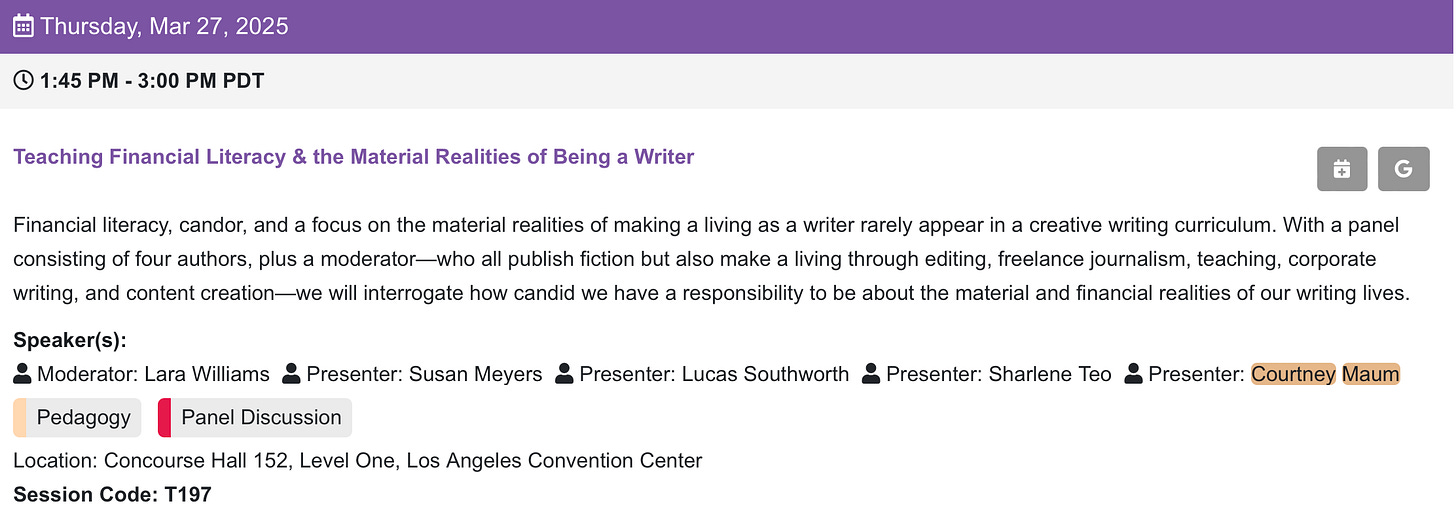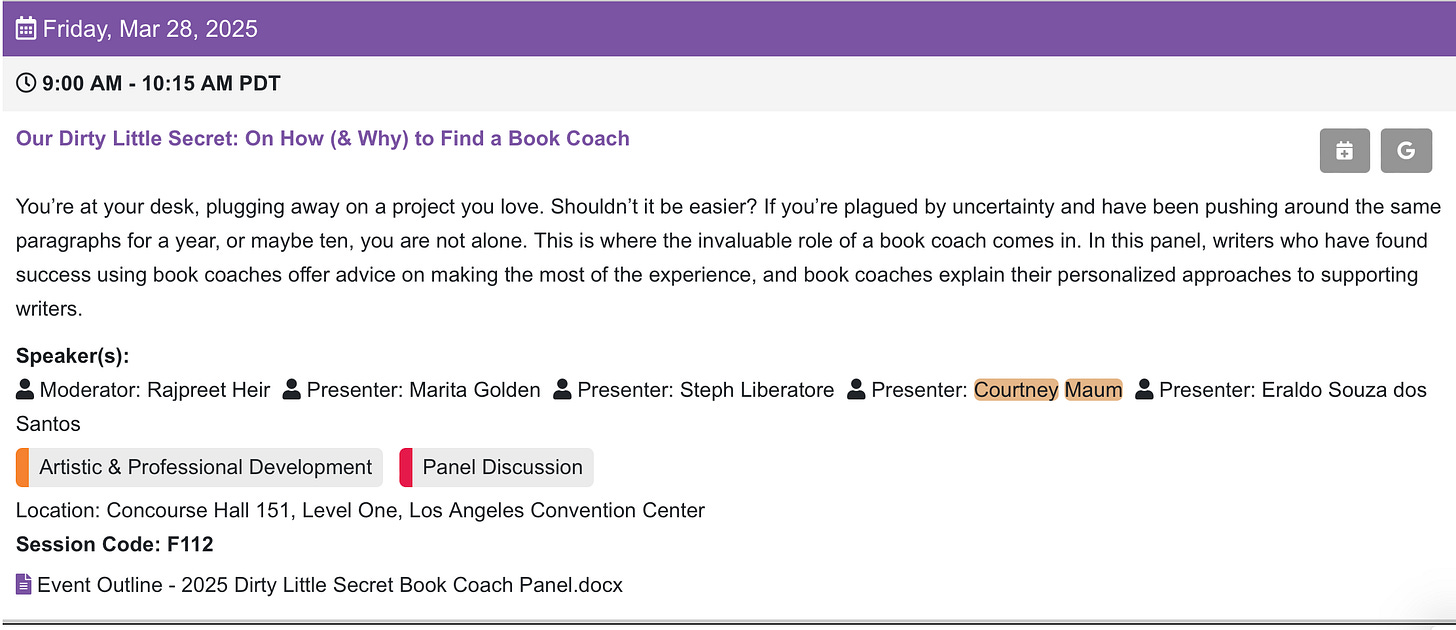My top tips for AWP Los Angeles 2025
Practical advice if you're headed to the country's largest writing conference next week.
Hi there and TGIF.
I wanted to pop in with my top tips for those of you headed to AWP next week. Not just tips for the sprawling and highly social conference itself, but specifically for the conference being in Los Angeles, which is a tricky city to hold a literary conference in.
I’m gonna jump right into it, because those of us attending need to plan and pack.
Bring a snowsuit. Not an actual snowsuit, but a light sweater and/or a serious scarf or neck warmer because the air conditioning in the conference center is usually set to arctic temps. Especially for panelists who might be feeling nervous—goose bumps from the AC won’t help, so bring layers you can fit into your bag.
Bring a water bottle. Last year, bottles of water at the conference center were $8 each, so don’t leave your reusable bottles at home.
Bring caffeine from somewhere else. If you don’t have a lot of time between panels, just know that the lines for the conference center coffee shops tend to be long as heck. So maybe pack some chocolate or a can of Joe.
Pack protein-filled snacks. Given the price of Conference Center Poland Spring, you can imagine how much a pack of nuts runs at the conference. AWP generally involves a lot of nerves and nervousness, tons of running around, and for those who drink alcohol, it involves a lot of that—plus, regular meals are hard to come by when you’re going from panel to panel. I’m a protein freak, so one year I just kept a jar of peanut butter in my backpack and would take spoonfuls of it, but I can’t recommend this approach because the peanut oil leaked all over my backpack and the books I had inside it. So pack a different snack.
Make sure you want to go where you are planning to go before you get into that Uber. Here’s the problem with holding AWP in Los Angeles (I speak from experience because I attended AWP in Los Angeles in 2016). The city’s the perfect size for a hedge funder conference, because finance people can usually afford to gallivant around the city taking twenty-minute long cab rides seven times a day. Us writers though? We can’t. When AWP is in smaller cities, the great thing is you can actually see where people are going once panels are done. Like, you’ll actually see a nice pack of people walk out of the conference hotel and stroll down two blocks to go to whatever pub is hosting an off-site event. The stakes are low if you don’t like the off-site party you followed this crew too—or you can’t get into it because it’s at capacity— you can just walk back to the hotel bar and regroup with your friends (or make friends at the hotel bar where everyone congregates when they don’t know where else to go). In LA, the financial stakes are much higher in terms of party chasing. If you take a $30 Uber only to arrive at The Hot Stuff Literary Mega Bash and learn there’s no chance in hell that you’re going to get in, then you jump in another cab and end up splitting a $40 ride to a karaoke party that turns out to have migrated somewhere else…you’ll quickly rack up some serious expenses with little to show for all that time in cabs. If this isn’t your first AWP and you already have writer friends, try to secure someone who can text you from the front lines. (“How long is the wait at the BOMB party? Where are people considering going next?” “What’s the vibe at the hotel bar?”) If you haven’t had the opportunity to make writer friends yet, call the bar! Ask them if they know how long the wait is to get in for whatever party; what is the crowd like. Such a call could save you tons of cash.
Pack business cards or make your own. I know, I know. This recommendation feels so 1990s. But you are going to meet SO MANY PEOPLE at this conference, and do you have the time in 2025 to be typing a bunch of names into Instagram trying to remember who you met and wanted to stay in touch with? No, you don’t! Because it’s 2025, you might not even be on Meta-owned sites anymore! I’m a huge fan of business cards especially for people who have published a book or have a service to offer (book coaching, editing, copyediting, professional hugging, what have you.) While it might seem really old school to hand someone a business card, I actually find it more welcome than someone asking to enter my deets into their phone. That, to me, is not only a huge leap forward in the intimacy department, but it doesn’t work. Inevitably, I end up with post AWP text messages like, “Hey!” that I delete and block because I think they’re spam, only to later realize that the text was probably from one of the nice people I met at AWP. If you don’t have business cards on hand, you can create your own and pre-cut them to hand out to quality folks. (Not to everyone, you don’t want to go around spamming people— but if you met someone great and they’re dashing out of the room, it’s honestly so convenient to just hand them a little card even if it’s just your handwriting on a scrap of paper.) You just need your name, email address, phone number if you’re comfortable and social media handles— if you’re tech savvy, you can even pre-make your own cards with a QR code connecting to your favorite social media site or newsletter.
Pay people for their time. I’ve volunteered at booths at AWP and I can tell you that the writers who come to the book fair booths, take the free pencils or erasers or whatever is on offer, fondle some of the publications and get the booth workers to divulge what kinds of work they’re publishing, then drift away with a meek thank you without having bought anything? Your name will be remembered as someone who isn’t serious, wastes other people’s time and doesn’t understand how the book world works.1 Success at AWP as an emerging writer is as simple as this— if you want insight on why your work wasn’t accepted to a particular magazine or press, or you want to hear more about what kinds of work the outlet is seeking, you must buy something from the table first. Literally, this is the most effective tip I have for you that could be a major game changer. Buy something from the table before you ask your questions. By buying something first, you will 1) lift the booth worker’s spirits and 2) make it clear that you have earned the right to pick their brains and 3) participate in the publishing world in a meaningful way. Plus, once you take the magazine or books home, you’ll have a tangible example of what the press is publishing. The first time I went to AWP in 2010, I had been submitting to magazines I’d never even seen in person and when I got to the book fair, I nearly died once I started touching, buying, and reading the mags I’d been submitting to. I was so far off the mark! I was sending humorous pieces to outlets that didn’t publish humor; I was sending experimental work to places that did straight narrative… in short? I was wasting people’s time. That first AWP, I bought so many books and magazines, I had to ship them home because they wouldn’t fit in my suitcase, but my acceptance rate completely changed once I read—and started subscribing to—the magazines I bought. I remember signing up in person for an annual subscription to The Normal School, and the next time I submitted something to them (with a little reminder that we’d met at their AWP table and that I was a subscriber), I got personalized feedback to my submission, ditto with McSweeneys, Tin House and Hobart— which I also bought books from and magazine subscriptions to back in 2010. I ended up penning humor columns for both Tin House and Hobart only two years later—and Tin House is the publisher of two of my books. SO BUY BOOKS FROM THE BOOTHS!
Keep records of your expenses for your taxes, if you decide to pay them in 2025 lol. Following off the above, if you can prove to the IRS that you are a writer or are actively working to become one, your lodging, meals, transportation and book purchases could qualify for tax exemptions. SO BUY BOOKS FROM THE BOOTHS!
Ship books home as needed. Don’t let luggage space keep you from buying books and magazines, especially on the last day of the fair when most publications are drastically reduced, and especially in a political climate where literature is endangered. Fixed rate priority shipping from the USPS is quite reasonable, and the shipping cost could be a tax deduction (see above). Trump wants to kill the USPS (I would take a bullet for my local post office) so let’s give the post office all the business that we can!
Okay, I’m off to do my Friday things. A reminder that these are my two panels at AWP— I can bring bookplates if anyone wants me to sign one in person and then bring it home and stick it inside a book of mine? I’ll also have business cards ;)
Safe travels and happy AWP-ing! Feel free to share this with friends who are also headed to Los Angeles, especially if they’ve never been to AWP before.
Courtney
Literally, your name will be remembered because you have to wear a name tag badge to get into the book fair.






LA is not as hard as it seems. I'm a writer and author who lives here. I won't be going to AWP this year, but let me add to Courtney's list. Downtown is full of terrific eating spots. Go to Grand Central Market, an indoor and outdoor venue that's got everything from deli food to egg places (like Egg Slut; yes, really, that's what it's called) to Thai places like Sticky Rice to It's a wonderful place to get a feel for our diverse and lively city if you've never been to LA. If you have time also wander around the the Arts District and Little Tokyo. Lots of people don't realize this, but we have have a very efficient subway system called Metro that can get you around downtown. Oh, the rooftop bar at The Ace Hotel. Go there for drinks! xo Mona
Number 7 especially. I worked the book fair at AWP from 2004 to 2018, first as an editor for a nonprofit book publisher and then as managing editor for a nonprofit literary magazine. I can’t tell you how often someone would ask me what my magazine “was looking for,” but then never actually bought an issue. If you seriously hope to be published somewhere, learn what they publish by buying an issue. And then help ensure they continue to exist (in order to publish you perhaps) by . . . buying an issue (or book).